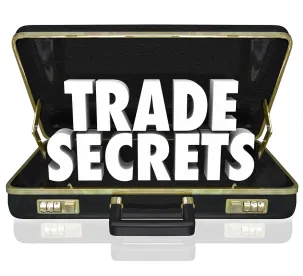Consider the following scenario that was the premise of the book Charlie and the Chocolate Factory (1964), and later adapted into the classic film Willy Wonka & the Chocolate Factory (1971): your company (Willy Wonka Chocolates) is in the candy business and develops an idea for an everlasting gobstopper (a sucking candy that never gets smaller). Anticipating substantial profits from the product, the company designates the everlasting gobstopper formula as a trade secret. As in the book and film, a rival chocolate company (Slugworth Chocolates) seeks to steal the trade secret formula in order to develop and market a competing gobstopper.
While Charlie and the Chocolate Factory is premised on a local competitor seeking to steal trade secrets for its own business, this post focuses on an adaptation to the story based in today’s global economy, and more specifically, the actions a company may take within the United States and abroad to protect against trade secret misappropriation.
Most U.S. companies are now aware of the protections afforded by the Defend Trade Secrets Act of 2016, 18 U.S.C. §§ 1836, et seq. (the “DTSA”). Of most importance is that the DTSA created a uniform legislation that provides companies with a private civil cause of action for trade secret misappropriation. As a result of enactment of the DTSA, a company that is the victim of trade secret theft has standing to file a civil suit in federal court. The company may also report the theft to the United States Department of Justice because, in certain cases, the theft of trade secrets constitutes a crime under the federal Economic Espionage Act, 18 U.S.C. §§ 1831, et seq. (the “EEA”).
Due to jurisdictional limitations, however, the DTSA and EEA may not provide adequate protection when there has been a misappropriation of trade secrets in the international arena. Companies should, therefore, be aware of other methods to protect against trade secret misappropriation abroad. One method is through the United States International Trade Commission (the “ITC”), an independent, quasi-judicial federal agency with broad investigative responsibilities on matters of trade. Pursuant to the Smoot-Hawley Tariff Act of 1930 (the “Act”), the ITC has jurisdiction to investigate and can render unlawful, the importation of goods stemming from “unfair methods of competition and unfair acts in the importations of articles … in the United States.” The ITC has determined that trade secret misappropriation is a form of unfair competition that is protected under Section 337 of the Act, and the United States Courts of Appeals for the Federal Circuit has affirmed this interpretation in two separate cases. See Sino Legend Chemical Co. v. ITC, 623 Fed. Appx. 1016 (Fed. Cir. 2015), cert. denied, 196 L. Ed. 2d 517 (2017); TianRui Group Co. Ltd. v. ITC, 661 F.3d 1322, 1327 (Fed. Cir. 2011).
In Sino Legend Chemical Co., employees had been working for a U.S.-based company at a facility in China. The employees stole trade secrets from the company and brought them to Sino Legend Chemical Co., a competitive Chinese company that began developing a competitive product and sought to sell it in the United States. The U.S. company filed a complaint with the ITC, and after investigation, the ITC instituted a 10-year ban on the importation of products resulting from trade secret misappropriation that had occurred entirely outside the United States. On appeal, Sino Legend urged the Federal Circuit to overturn the ITC’s decision, arguing that Section 337 of the Act should not apply because the trade secret misappropriation occurred entirely outside the United States. The Federal Circuit disagreed and affirmed the 10-year ban instituted by the ITC, and in 2017, the United States Supreme Court declined review.
A company should be aware that even if a theft of trade secrets occurs abroad, the company may seek relief through the ITC to prevent the importation of competitive products into the United States that are developed as a result of the stolen trade secrets. Of course, relief through the ITC is limited because the ITC cannot stop the offending company that stole the trade secrets from marketing a competitive product in countries outside the U.S. There remain, however, other methods to protect against the misappropriation of trade secrets abroad.
Similar to the DTSA, the European Union (“EU”) enacted its own framework for the protection of trade secrets via a directive that went into effect on June 8, 2016. The EU directive provides protection of “undisclosed know-how and business information against their unlawful acquisition, use and disclosure.” Although the EU directive does not establish criminal sanctions, it does provide for civil means through which victims of trade secret misappropriation can seek protections, such as: (i) allowing for temporary restraining orders and injunctive relief; (ii) removal from the market of goods manufactured based on stolen trade secrets, and (iii) monetary damages. Pursuant to the EU directive, each member country must incorporate the required provisions into its laws by June 9, 2018. Importantly, the EU directive contains only the minimum requirements for the protection of trade secrets; however, each EU member country may elect to enact stronger protections. It remains to be seen whether the EU countries will enact provisions more stringent than the EU directive.
Companies need to protect themselves from the Slugworths of the world. In Charlie and the Chocolate Factory, Slugworth was a local competitor that sought to steal Willy Wonka’s trade secrets, but in today’s global economy, Slugworth can steal trade secrets from anywhere and can also market competitive products throughout the globe. As a result, companies need to be well versed in the various global protections against misappropriation of trade secrets. Use of counsel knowledgeable of these various protections is critical to ensure that all avenues of relief are considered.





 />i
/>i

